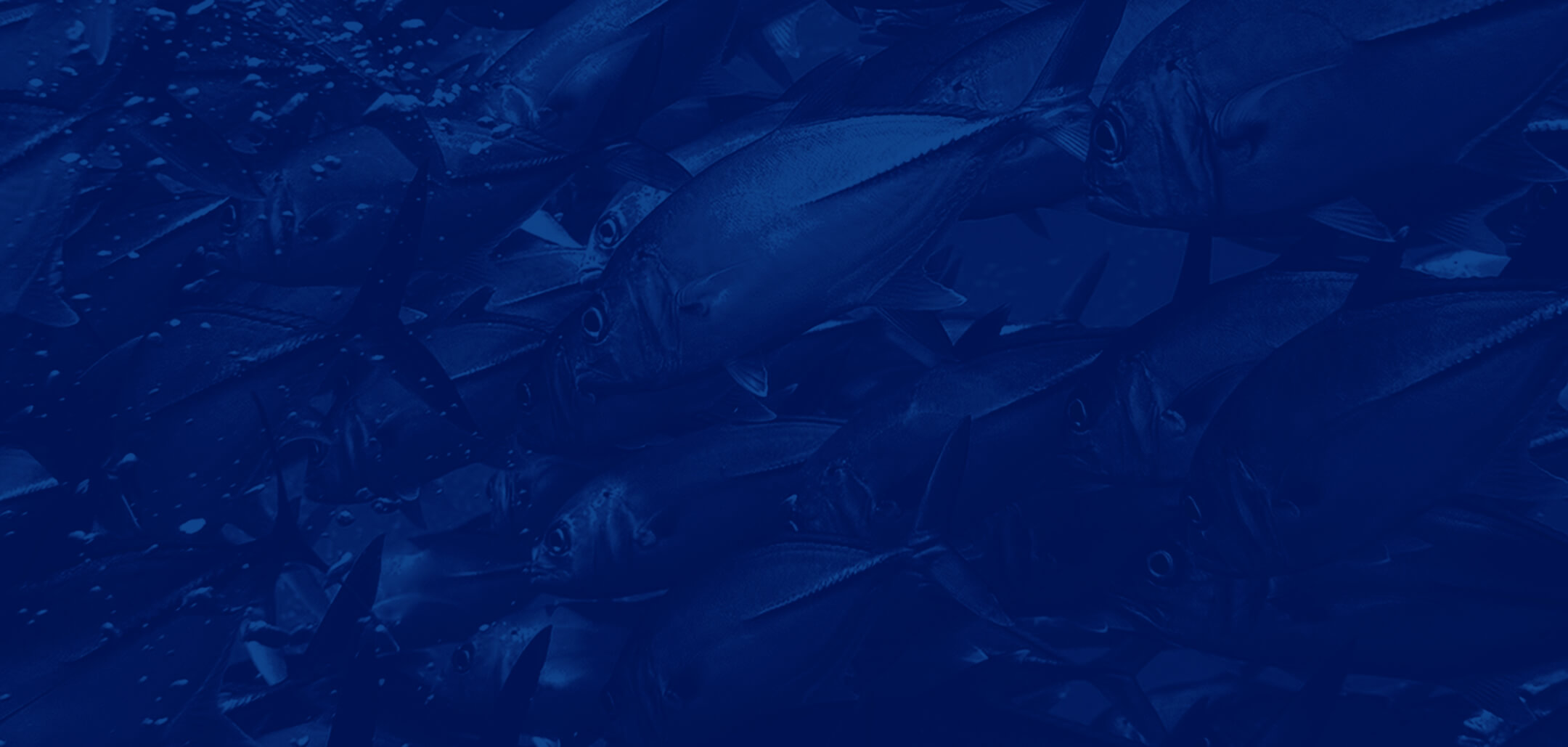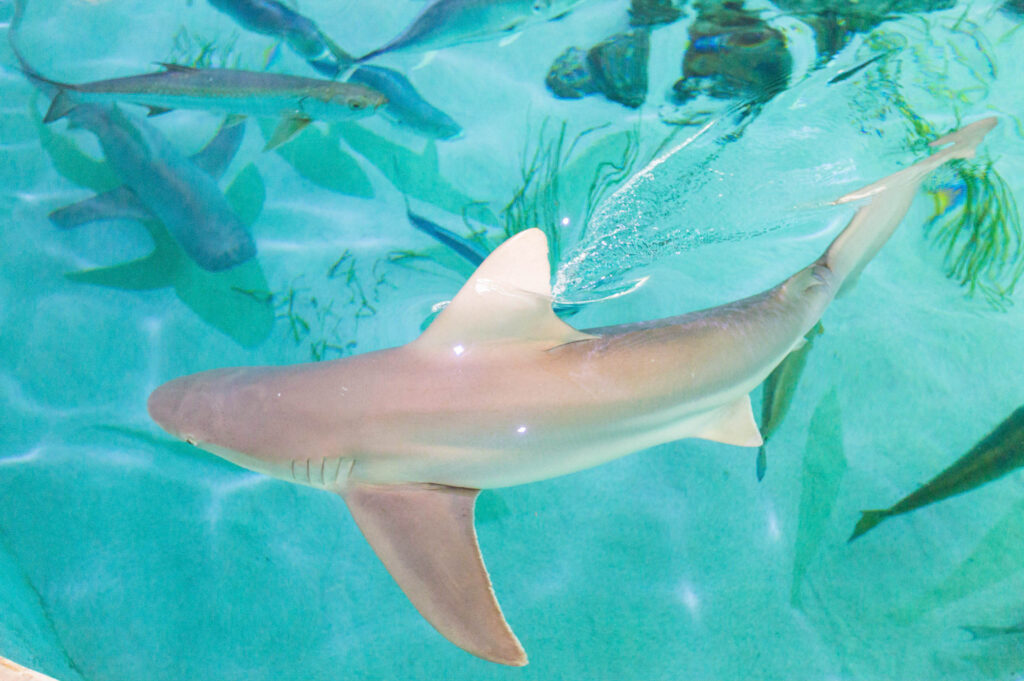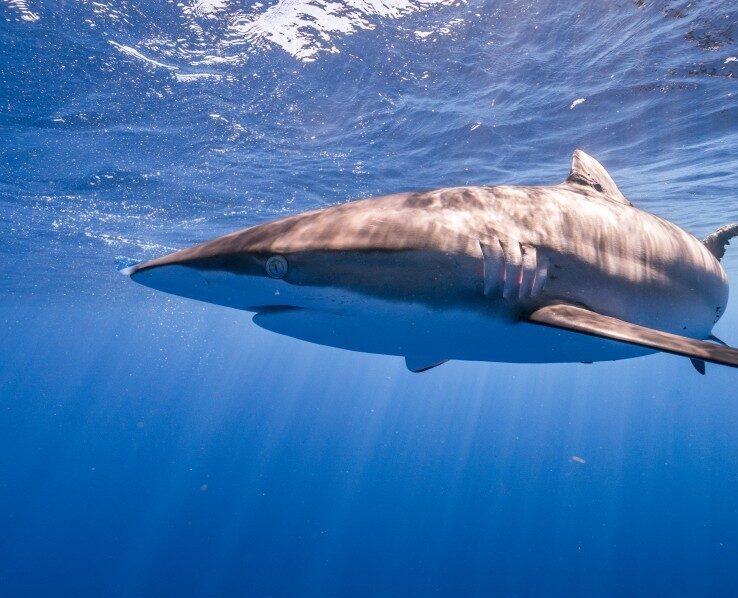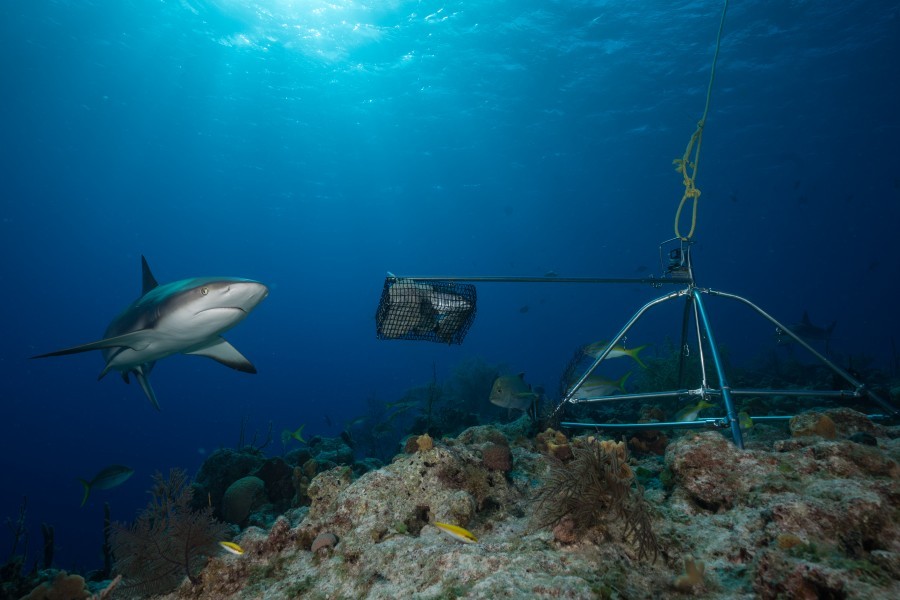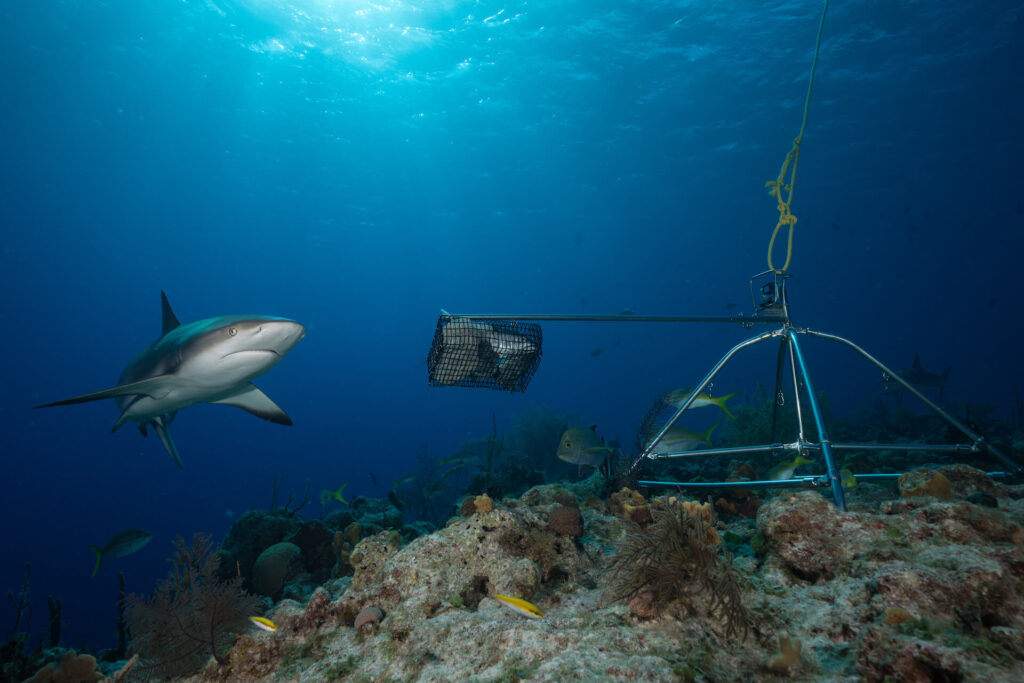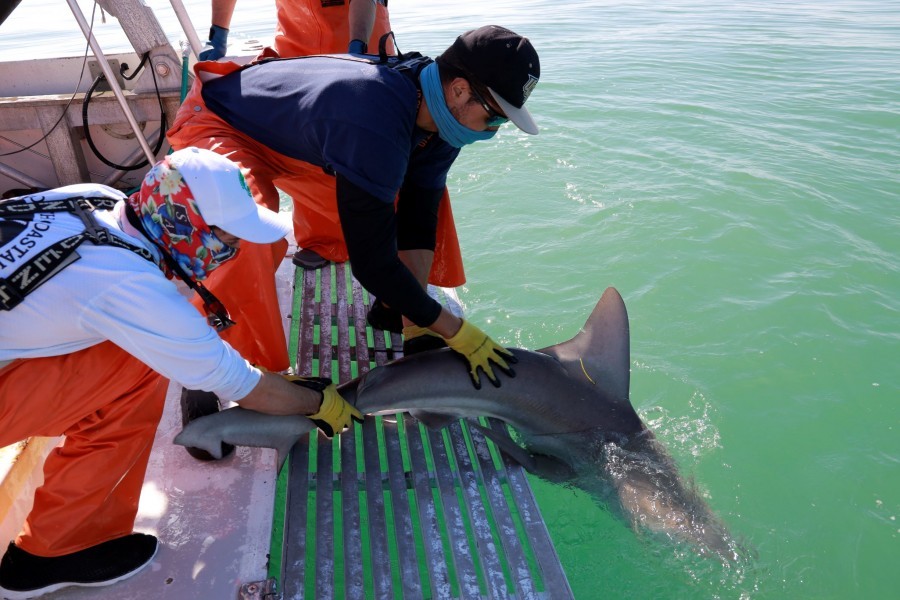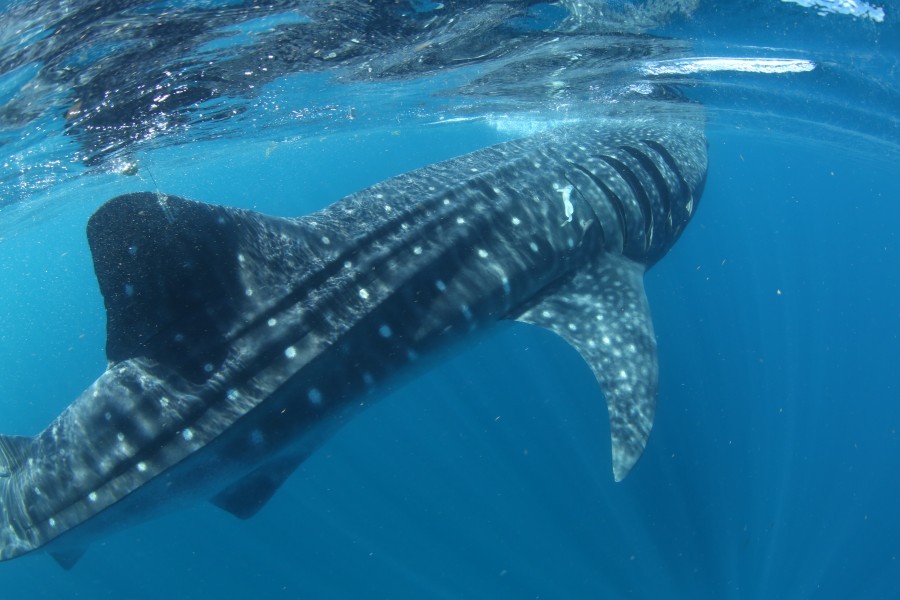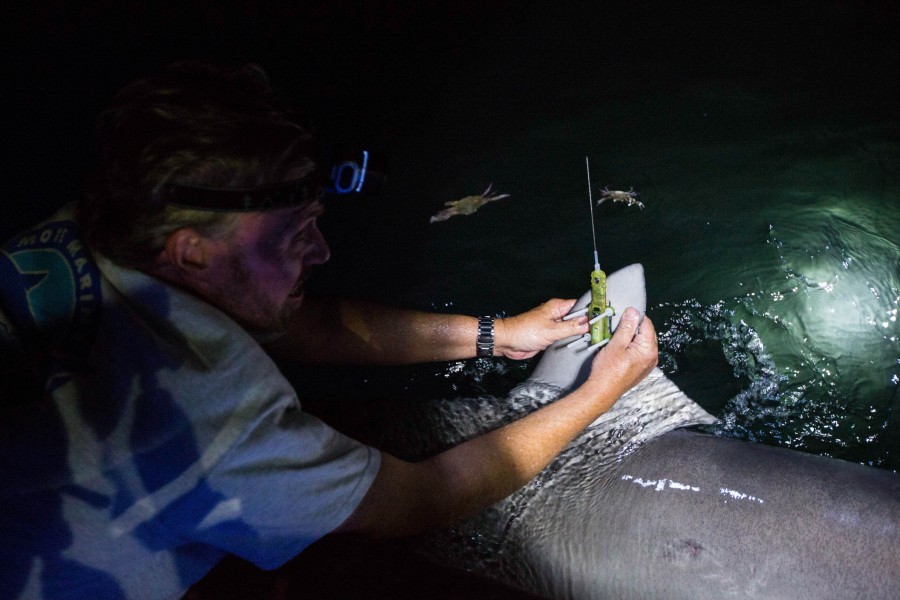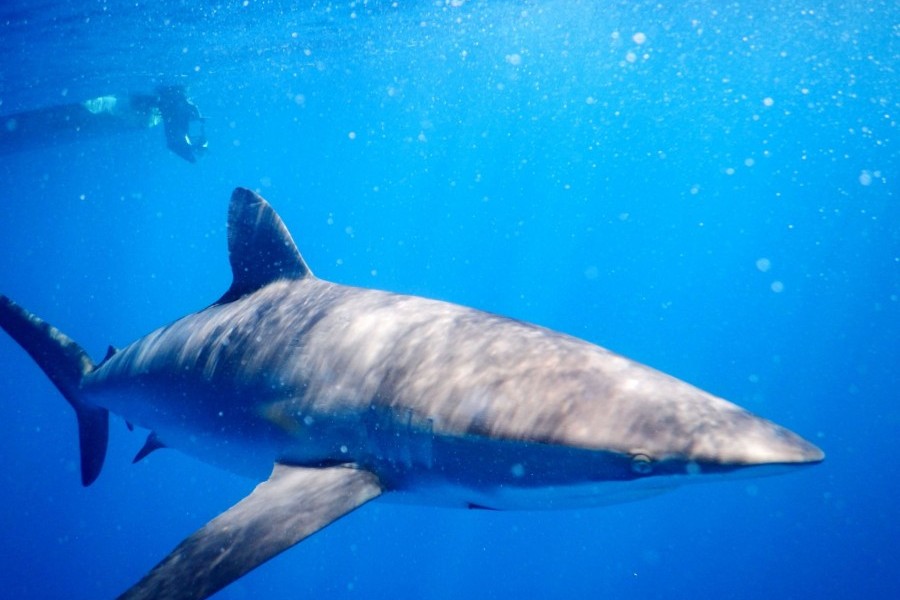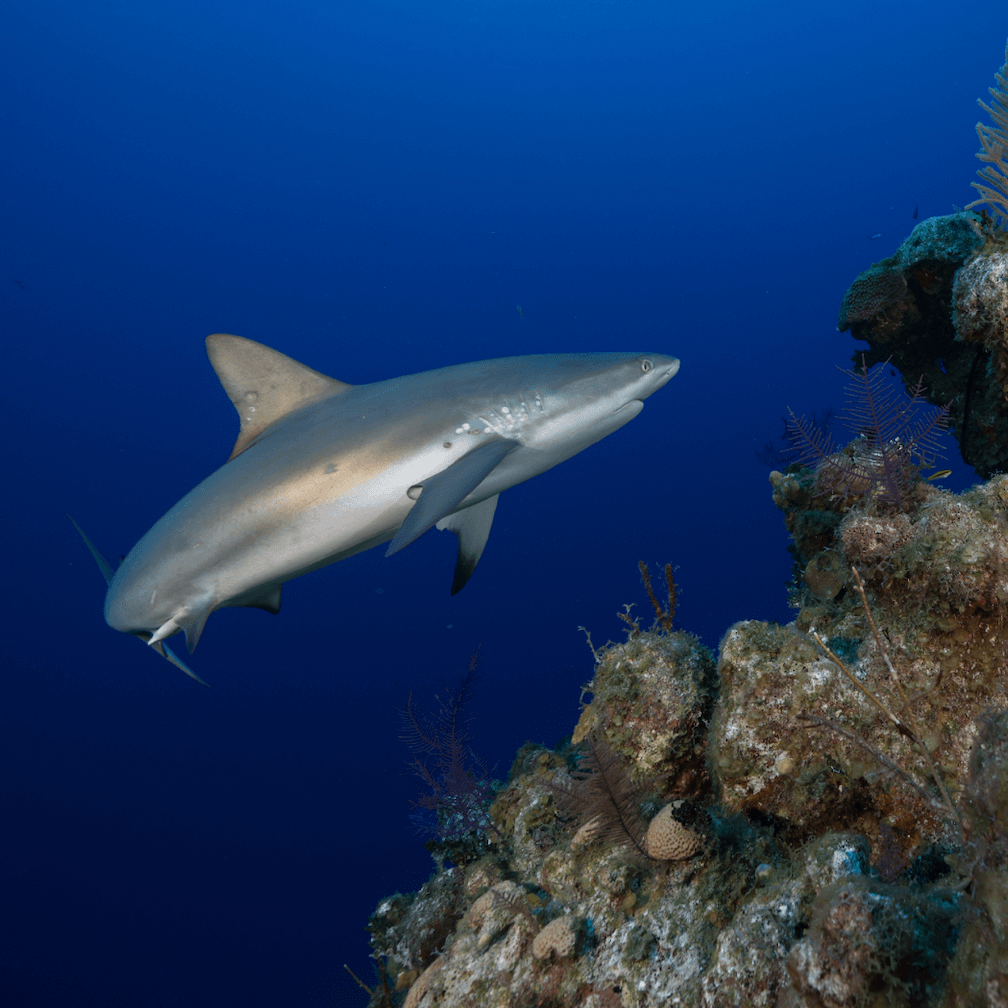Breakfast with the Sharks
Rise and dive! Start your day with our sharks before the Aquarium opens to the public. You and your chums will have a great time sinking your teeth into a light continental breakfast while you learn about our favorite finned...
Insights into the Relative Abundance, Life History, and Ecology of Oceanic Sharks in the Eastern Bahamas
Fisheries-independent data on the diversity, relative abundance, and demographic structure of poorly studied, threatened oceanic sharks are absent from much of the western North Atlantic Ocean, where multiple oceanic shark species...
Widespread diversity deficits of coral reef sharks and rays
A global survey of coral reefs reveals that overfishing is driving resident shark species toward extinction, causing diversity deficits in reef elasmobranch (shark and ray) assemblages. Our species-level analysis revealed global declines...
Sharks After Dark (Sarasota)
Join us for Mote’s newest family night of fins and fun! It will be a jaw-some time as our professional educators and shark enthusiasts explore the question “What do sharks, stingrays and other marine creatures do when the sun goes...
Breakfast with the Sharks (Sarasota)
Rise and dive! Start your day with our sharks before the Aquarium opens to the public. You and your chums will have a great time sinking your teeth into a light continental breakfast while you learn about our favorite finned...
Sharks & Rays Conservation Research
The Sharks & Rays Conservation Research Program is dedicated to studying the biology, ecology and conservation of sharks and their relatives, the skates and rays. These fishes comprise about 1,000 species...
Next phase of Global FinPrint seeks to improve protection of reef sharks worldwide
With reef shark populations in crisis, Mote Marine Laboratory & Aquarium and partners from across the globe are updating the seminal shark survey, Global FinPrint, and applying their findings to the design of new marine protected...
Global study finds reef sharks now at a higher risk of extinction
Overfishing is driving reef sharks toward extinction, according to new study published today in the peer-reviewed journal, Science. The five main shark...
Achieving fin-tastic firsts with sharks, rays, fisheries – 2020 Annual Report
This story is a highlight from Mote's 2020 Annual Report. SUSTAINING FISHERIES—GLOBAL SPOTLIGHT ON MOTE In November 2019, Mote...
Social distancing may be new for humans, not so much for whale sharks
In 2007 scientists from Mote Marine Laboratory and Ch’ooj Ajauil AC placed a location-tracking tag on a whale shark nicknamed "Rio Lady" and documented her epic migration spanning close to 5,000 miles. Now, Rio Lady is back in the...
Mote receives federal grant to study highly migratory sharks as part of new consortium
Sarasota, Fla. — October 2, 2019 — Mote Marine Laboratory is bringing its long history of shark expertise to a new consortium studying highly migratory species, thanks to new funding from the National Oceanic and Atmospheric Administration...
Global threat to sharks highlighted in Nature paper co-authored by Mote scientists
A new study in the prestigious, peer-reviewed, scientific journal Nature reveals that major high seas fishing activities overlap significantly with important shark hotspots worldwide. Study partners point out that North...
Mote scientists tag two whale sharks off southwest Florida
Written by Stephanie Hagan Thanks to whale shark sightings reported by the public off the southwest Florida coast in early June, scientists from Mote Marine Laboratory located five of the polka-dotted, filter-feeding giants...
Great white sharks off Nantucket in the scientific spotlight
OCEARCH EXPEDITION WITH FLORIDA SCIENTIFIC LEADER AIMS TO BUILD UPON SERIES OF SHARK-TAGGING SUCCESSES Today OCEARCH and its collaborating scientists launched a three-week expedition to tag mature great white sharks off Nantucket,...
Do sharks survive after the hook? New technology helping solve fisheries mystery
Fitbit-like sensors are the best tools for monitoring whether sharks survive catch-and-release fishing — essential data for fisheries management — according to a peer-reviewed study published today, June 23, by scientists from...
Earth Day Webcast: “Sharks Alive!” with Mote
Kids around the world can watch “Sharks Alive!” – a free webcast by Mote Marine Laboratory via Google Hangouts and Youtube from 10 – 10:25 a.m. EST on Earth Day, April 22. “Sharks Alive!” will focus on shark research...
Endless Oceans: Lifelong Learning with Mote
Marine Science 101 Curious about our oceans? Interested in expanding your knowledge while also expanding your network? We welcome you to explore the world of marine science...
Results and Impacts of the First Decade of the Florida RESTORE Act Centers of Excellence Program
Thriving coastal and Gulf environments that support wild and human lives. Sustainable fisheries for recreation and sustenance. Knowing where (and how) juvenile sea turtles travel when they leave Florida beaches and how they are impacted...
Health Risk Assessment of Globally Consumed Shark Derived Products
Shark meat and fin soup are seafood commodities exported and consumed worldwide. Because sharks are large and slowgrowing marine predators they tend to accumulate a large amount of mercury in the form of methylmercury. Due to this...
Reproductive timing and putative mating behavior of the oceanic whitetip shar Carcharhinus longimanus in the eastern Bahamas
Oceanic whitetip sharks Carcharhinus longimanus aggregate at Columbus Point, Cat Island, The Bahamas, in at least April and May. We show that signs of putative mating activity (i.e. bite wounds) on mature females, which dominate...
From rivers to ocean basins: The role of ocean barriers and philopatry in the genetic structuring of a cosmopolitan coastal predator
The Bull Shark (Carcharhinus leucas) faces varying levels of exploitation around the world due to its coastal distribution. Information regarding population connectivity is crucial to evaluate its conservation status and local fishing...
Characteristics and species composition of a small-scale shark fishery in Puerto Rico: Jurisdictional issues enable legal landings of prohibited...
Shark fishing is increasingly regulated in the Caribbean region. We present new information on the characteristics, landings, species composition, and size composition of the shark fishery of Puerto Rico, a U.S. Caribbean territory,...
Dr. Krystan Wilkinson
Krystan Wilkinson is a postdoctoral scientist employed by the Chicago Zoological Society and based at Mote Marine Laboratory as part of a partnership to engage in dolphin research, education and conservation action. Wilkinson is...
Leah Roberts-Hays
By the age of ten Leah knew she wanted to be a marine biologist. She attended Ohio University where she majored in marine, freshwater and environmental biology and completed an internship in Clearwater as a water quality technician...
Dr. Robert “Bob” Hueter
Dr. Robert (Bob) Hueter is a Mote Senior Scientist Emeritus and was the first Director of Mote's Center for Shark Research and the first recipient of Mote's Perry W. Gilbert Chair in Shark Research. The Mote CSR is a national research...
Felicia Manning
Felicia was born and raised in Oklahoma and is a proud member of the Cherokee Nation tribe. She has worked with and has an appreciation for both terrestrial and marine species. She received her bachelor’s degree in Wildlife Science...
Averi Hellrung
Averi has volunteered with Mote since 2019 and interned with the Mammal and Reptile Department during the winter (2022-2023). In between when she started volunteering and her internship, she got a Master...

